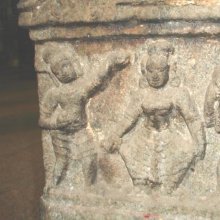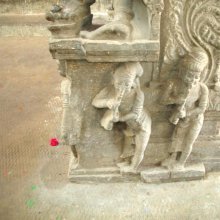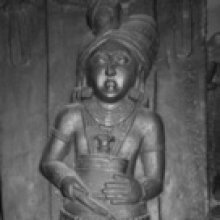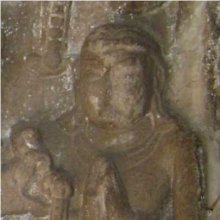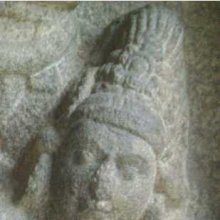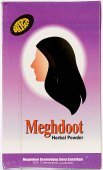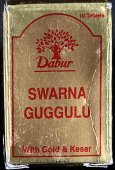Male, Mālē: 6 definitions
Introduction:
Male means something in the history of ancient India, Hindi, biology. If you want to know the exact meaning, history, etymology or English translation of this term then check out the descriptions on this page. Add your comment or reference to a book if you want to contribute to this summary article.
Images (photo gallery)
(+75 more images available)
India history and geography
Source: Project Gutenberg: Castes and Tribes of Southern India, Volume 1Male (“garland”) is one of the many exogamous septs (division) among the Holeyas (field labourers). There are customs remaining which seem to indicate that the Holeya people were once masters of the land.

The history of India traces the identification of countries, villages, towns and other regions of India, as well as mythology, zoology, royal dynasties, rulers, tribes, local festivities and traditions and regional languages. Ancient India enjoyed religious freedom and encourages the path of Dharma, a concept common to Buddhism, Hinduism, and Jainism.
Biology (plants and animals)
Source: Wisdom Library: Local Names of Plants and DrugsMale in the Marathi language is the name of a plant identified with Panicum antidotale Retz. from the Poaceae (Grass) family having the following synonyms: Panicum miliare, Panicum proliferum. For the possible medicinal usage of male, you can check this page for potential sources and references, although be aware that any some or none of the side-effects may not be mentioned here, wether they be harmful or beneficial to health.
Source: Google Books: CRC World Dictionary (Regional names)1) Male in Guinea is the name of a plant defined with Oryza sativa in various botanical sources. This page contains potential references in Ayurveda, modern medicine, and other folk traditions or local practices It has the synonym Oryza sativa subsp. indica Kato (among others).
2) Male in India is also identified with Panicum antidotale It has the synonym Paspalum miliaria C. Muell. (etc.).
3) Male in Nigeria is also identified with Khaya grandifoliola.
4) Male is also identified with Khaya ivorensis It has the synonym Khaya klainei Pierre ex Pellegr. (etc.).
Example references for further research on medicinal uses or toxicity (see latin names for full list):
· Journal of Cytology and Genetics (1983)
· Physis. Revista de la Sociedad Argentina de Ciencias Naturales (1933)
· Nomenclator Botanicus (1821)
· Blumea (1987)
· Proceedings of the Indian Science Congress Association (1988)
· Phytomedicine (2004)
If you are looking for specific details regarding Male, for example extract dosage, pregnancy safety, side effects, health benefits, chemical composition, diet and recipes, have a look at these references.

This sections includes definitions from the five kingdoms of living things: Animals, Plants, Fungi, Protists and Monera. It will include both the official binomial nomenclature (scientific names usually in Latin) as well as regional spellings and variants.
Languages of India and abroad
Hindi dictionary
Source: DDSA: A practical Hindi-English dictionaryMale in Hindi refers in English to:—(nm) concord; consonance, agreement; match; mixture, combination; unity; conciliation; connection; mail train; —[ka] matching; -[jola/milapa] intimacy; reconciliation, rapprochement; union; —[gadi] a mail train; -[mulakata] approach; association, friendly relationship; -[mohabbata] mutual goodwill / affection; —[khana] to match; to be in agreement..—male (मेल) is alternatively transliterated as Mela.
...
Kannada-English dictionary
Source: Alar: Kannada-English corpusMale (ಮಲೆ):—
1) [verb] to behave insolently, impudently; to be haughty.
2) [verb] to resist defiantly.
--- OR ---
Male (ಮಲೆ):—[verb] to become muddy; to have the sediment stirred.
--- OR ---
Male (ಮಲೆ):—
1) [noun] a hill or mountain.
2) [noun] a forest on and around a mountain.
3) [noun] a region consisting mainly of hills and mountains.
4) [noun] an inhabitant of this region.
--- OR ---
Maḷe (ಮಳೆ):—[noun] the continuous fall of water drops from the clouds; rain.
--- OR ---
Maḻe (ಮೞೆ):—[noun] the continuous fall of water drops, in a large number, from the clouds; rain.
--- OR ---
Māle (ಮಾಲೆ):—
1) [noun] a string or garland of flower.
2) [noun] a string of beads, jewels, etc. or a chain of gold, etc. worn around the neck; a necklace.
3) [noun] a number of people or things arranged so as to form a line; a row.
4) [noun] a large number of perople, animals or things gathered at a place; a multitude.
5) [noun] a particuloar clan among Tuḷu people.
6) [noun] ಮಾಲೆ ಹಾಕು [male haku] māle hāku (a bride or bridegroom) to put a garland around the neck of the person whom one is marrying.
--- OR ---
Māḷe (ಮಾಳೆ):—[noun] = ಮಾಳ [mala]2.
--- OR ---
Māḷe (ಮಾಳೆ):—
1) [noun] a string or garland of flower.
2) [noun] a string of beads, jewels, etc. or a chain of gold, etc. worn around the neck; a necklace.
3) [noun] a number of people or things arranged so as to form a line; a row.
4) [noun] a large number of people, animals or things gathered at a place; a multitude.
5) [noun] a particular clan among Tuḷu people.
Kannada is a Dravidian language (as opposed to the Indo-European language family) mainly spoken in the southwestern region of India.
Nepali dictionary
Source: unoes: Nepali-English DictionaryMāle (माले):—adj. black and white; piebald;
Nepali is the primary language of the Nepalese people counting almost 20 million native speakers. The country of Nepal is situated in the Himalaya mountain range to the north of India.
See also (Relevant definitions)
Starts with (+84): Malayala, Male anal, Male bamboo, Male gasaya, Male honne, Male kola, Male mara, Male ponga, Male vimbou, Male-sagade, Maleali, Maleberry, Malebillu, Maleccha, Maleda, Maledurga, Maleelothus, Malefene, Maleferen, Malega.
Ends with (+151): Addamale, Adimale, Adumale, Akkamale, Akkaramale, Akkaramkamale, Akshamale, Aksharamale, Alarmale, Alimale, Amale, Amkamale, Ammale, Amshumale, Amtumale, Anemale, Aralelemale, Aralmale, Arisinakamale, Armale.
Full-text (+2315): Purusha, Upastha, Napumsaka, Pumskokila, Pumsavana, Mithuna, Angarakha, Pumapatya, Nishpurusha, Mardani, Pahunci, Katishula, Aina, Putrasantana, Aesagale maale, Rasabha, Rangu maale, Gohara, Adipurusha, Pumsuvana.
Relevant text
Search found 335 books and stories containing Male, Mālē, Maḷe, Maḻe, Māle, Māḷe, Maale; (plurals include: Males, Mālēs, Maḷes, Maḻes, Māles, Māḷes, Maales). You can also click to the full overview containing English textual excerpts. Below are direct links for the most relevant articles:
Tiruvaymoli (Thiruvaimozhi): English translation (by S. Satyamurthi Ayyangar)
Pasuram 1.5.11 < [Section 5 - Fifth Tiruvaymoli (Vala el ulakil mutalaya)]
Pasuram 2.5.9 < [Section 5 - Fifth Tiruvaymoli (Am Tamattu Anpu)]
Pasuram 2.5.10 < [Section 5 - Fifth Tiruvaymoli (Am Tamattu Anpu)]
Bhakti-rasamrta-sindhu (by Śrīla Rūpa Gosvāmī)
Verse 2.1.381 < [Part 1 - Ecstatic Excitants (vibhāva)]
Verse 1.2.302 < [Part 2 - Devotional Service in Practice (sādhana-bhakti)]
Verse 2.1.264 < [Part 1 - Ecstatic Excitants (vibhāva)]
The backdrop of the Srikanthacarita and the Mankhakosa (by Dhrubajit Sarma)
Part 2 - Dress and decoration (found in the Śrīkaṇṭhacarita) < [Chapter IV - Socio-cultural study of the Śrīkaṇṭhacarita]
Part 6 - Caste system and occupations (found in the Śrīkaṇṭhacarita) < [Chapter IV - Socio-cultural study of the Śrīkaṇṭhacarita]
Part 2d - Rasa (4): Hāsya or the sentiment of humour < [Chapter III - Literary Assessment Of The Śrīkaṇṭhacarita]
Chapter XVI - The Nature Of Procreation
Chapter X - The Battle With The Primeval Ox
Saying 114 - The Female Element Must Make Itself Male
Saying 22 - Those Who Enter The Kingdom Resemble Little Ones
Sahitya-kaumudi by Baladeva Vidyabhushana (by Gaurapada Dāsa)
Text 10.152 < [Chapter 10 - Ornaments of Meaning]
Text 7.140 < [Chapter 7 - Literary Faults]
Text 10.166 < [Chapter 10 - Ornaments of Meaning]
Related products
(+13 more products available)
